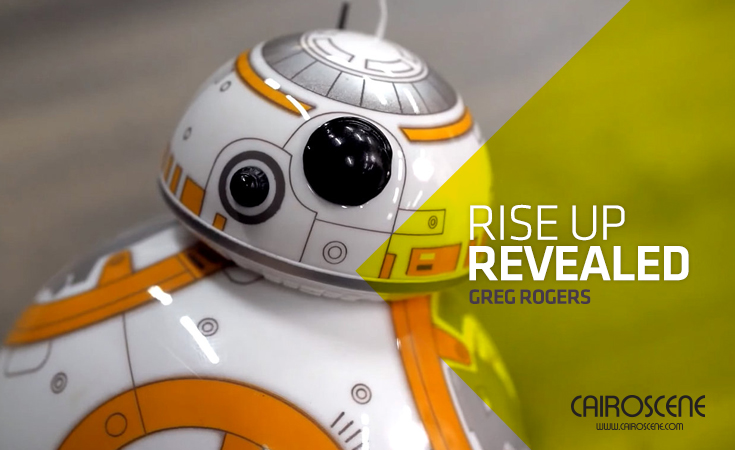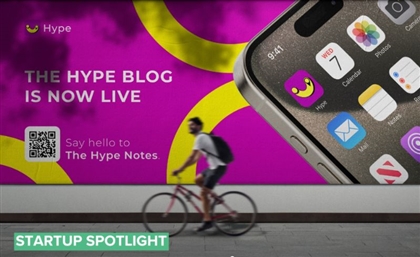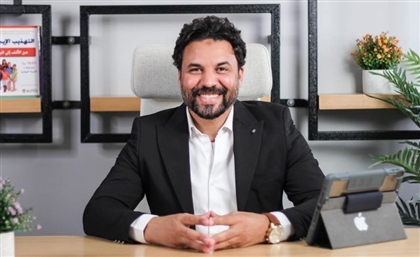Meet The Investor Bringing The Real Star Wars Droid to #RiseUp15
In the third edition of our collaboration with #RiseUp15, we meet Techstar's Executive Director, Greg Rogers, to unveil why Disney, multinationals, and Star Wars have much to do with the entrepreneurial world.

Greg Rogers has seen the rise of hundreds of startups at Techstars, a leading global accelerator for tech companies where he is an executive director. As he gears up for his arrival in Cairo to participate at this year's RiseUp Summit, he anticipates the thrilling, fantasy-sparking product he is bringing along: the Star Wars droid, the result and symbol of one of the partnerships Techstars facilitates between entrepreneurs and industry giants like Disney.
“We have been experiencing vertical growth, as more and more large corporations are coming to us as an accelerator because they have a real interest in working more closely with entrepreneurs,” he says. Exploring this confluence with fascination, Rogers tells the story of Sphero, the startup who launched the BB-8 Droid through the Disney Accelerator which is managed by Techstars.
“Sphero went through the first Disney programme. They worked with the company to create a robot, controlled by an iPhone, which looks and functions similarly to the new Star Wars movie robot,” he says.
According to Rogers, large corporations are increasingly seeking to collaborate with startups, recognising them as engines of innovation. “I have heard one of our many partners give a statistic that startups can do it five times faster and three times cheaper than them, so it benefits both parties because they can offer entrepreneurs huge numbers of clients and distribution channels,” he says.
Currently managing a FinTech partnership with Barclays across four continents, Rogers will lead a Techstars workshop at the Riseup Summit, bringing participants an opportunity to draw wisdom on how to best work with corporates and meet the iconic BB-8 just days before the movie release in Cairo. As he cooks up the workshop, the Executive Director of this giant accelerator that boasts an ecosystem of no less than 5,000 mentors, investors and founders, gives CairoScene some investment insights.
What qualities do investors usually seek in an entrepreneur?
The best VCs (venture capitalists) will say that in early stages, the only thing that matters is the strength of the team. The strategy and product will change, but not the team, and it is the only thing we can correlate to success in building a company. It’s their ability to be flexible, to manage the ups and downs of entrepreneurship, to navigate the hindrances and barriers and be able to sell their idea and vision.
Great VCs are not as much bankers as they are psychologists; bad VCs focus on products. We are rarely trained to understand who is sitting in front of us, and it is key to understand: are they going to be the next Steve Jobs? You will notice that the greatest ones really focus a lot of the questions on you, the entrepreneur; they will even try to understand your childhood.
And the characteristics of a winning pitch?
The first thing I look at is the team and their background. What in the history of the team indicates that you can pull this off? Secondly, a transformative idea: 99% of pitches are incremental, taking a known business model and making it better; but what we are really looking for is the audacious idea, the one that comes and says: “Hey, I have this idea where people will rent their rooms.” But it's the team that makes you wonder if they can really pull it off. Most VCs turned Airbnb down; but then they looked at the team. The third thing is: do I love it? Do I care enough about the problem they are solving? The best investor will go “oh my lord, I share their passion” and add a lot of value, working with the entrepreneurs and thinking about their strategy. If the three things come together, it’s a great pitch.

Rogers will be leading a workshop at the Riseup Summit next December.
What would you tell an entrepreneur who has failed several times?
Well, a lot of them have failed before. And ultimately what it will come down to is whether you learn from mistakes or not. When you go to raise investment, investors don’t mind that you failed in your previous startup; so if you go to them and tell them: “This is what I learned, I have to think bigger and transformative; and this is what I came up with,” it makes a difference. Most entrepreneurs who have failed fall into that category: they realise their idea was too small, they come back saying they were thinking too small, and this is where we will become really transformative. Most have to learn that lesson.
Has it ever happened to you?
My startups have had exits, although I am moving more into my investor role now. But I have done angel investments and have had failures; and it taught me a lot. You need to have a few failures so you start focusing on the things that really matter.
Is there a startup story that you find particularly inspiring?
There are many examples of stories where startups had tremendous difficulty in raising the next round, they thought they were going to close doors, they were rejected 99 times and thought they were finished, and then ONE meeting kept them going and turned them into an incredible company. What Techstars is about is providing network and support to get you to that 100th meeting and helping you meet the investor who trusts your idea. Most startups really need mentorship and a network, so that they save time and money, and don’t make costly mistakes. You need to have the humility to know that you don’t know everything. And that’s the power of all this: that network may provide the introduction to that 100th person who will say ‘yes’ to the idea.
Rogers will be speaking at this year's RiseUp Summit; for more information check out their Facebook page here or follow them on Instagram @riseupsummit.
- Previous Article Bassita: Click Funding for a Better Egypt
- Next Article New App Lets You Book A 'Vespa' For Your Next Ride






















